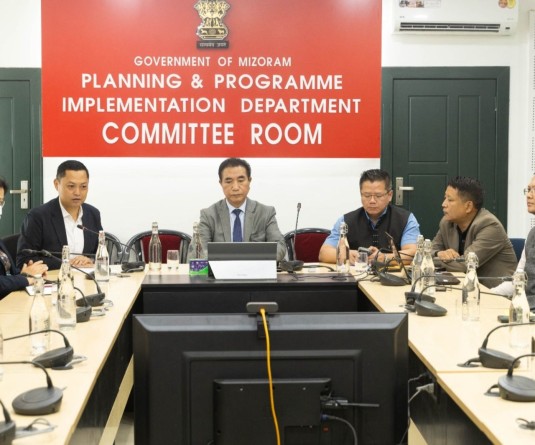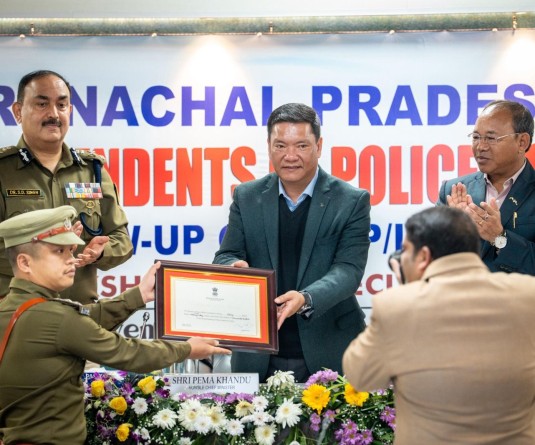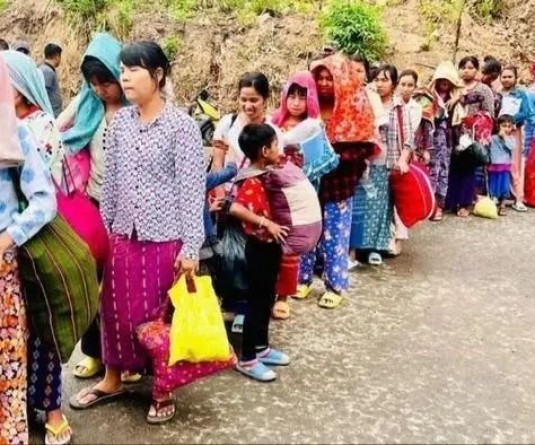Agartala:Supporters of the Tipra Motha party during a public rally as they demand for greater Tipraland in Agartala on Saturday November 12,2022.(Photo:Abhisek Saha/IANS)

Aizawl, July 9 (IANS) After the Citizenship (Amendment) Act (CAA), the Uniform Civil Code (UCC) is also being opposed by most of the non-BJP parties, including the allies of the saffron party, in the northeastern region where people belonging to Hindu, Christian and Muslim communities live in reasonable numbers.
Like the CAA, the ruling Mizo National Front (MNF), the Congress and the smaller parties including the Zoram Peoples Movement (ZPM), Mizoram People’s Conference (MPC) and other non-political organisations are strongly opposing the UCC.
The anti-CAA protests had first started in Assam, parts of West Bengal and other northeastern states in 2019 and continued till 2020 before the outbreak of the Covid-19 pandemic.
At least five persons were killed in the protests against the CAA in Assam, which also witnessed large-scale violence and imposition of curfew for several days.
The protest against the CAA is still going on and off in different northeastern states.
Strong opposition against the proposed implementation of the UCC has come from Mizoram, Meghalaya and Nagaland, which are Christian-majority and tribal dominated states.
Mizoram Pradesh Congress Committee (MPCC) strongly opposing the proposed law stressed on the united move against it. Senior Congress leader and former Rajya Sabha member Ronald Sapa Tlau said that state party president Lalsawta will submit a letter objecting to the UCC to the Law Commission of India.
“The Congress party invites people of all sections in Mizoram to join hands in opposing the UCC and the BJP to safeguard India's culture and religion,” Tlau said.
Reacting to the ruling MNF’s contention that article 371G of the Indian Constitution will safeguard the people of Mizoram, he said that the BJP government at the Centre cannot be trusted.
The Congress leader said that the move to make into law the proposed UCC should be opposed by all the people of the state in order to protect and safeguard our cultural and religious identity.
Terming the UCC dangerous for the integrity and unity of the country, the former parliamentarian said that its implementation would result in the oppression of minorities and minority religious communities and even their assimilation by the majority community.
The ruling MNF, the Mizoram Kohhran Hruaitute Committee (MKHC), conglomerate of major church leaders in the state and the Presbyterian Church of India’s Mizoram Synod have already submitted their opposition to the implementation of the UCC to the Law Commission of India.
The Mizoram Assembly on February 14 this year adopted a resolution proposed by Home Minister Lalchamliana opposing the UCC.
“That this House unanimously resolved to oppose any steps taken or proposed to be taken for enactment of UCC in India,” the resolution had said.
Mizoram chief minister Zoramthanga as president of the ruling MNF in a letter to the Law Commission on July 4 stated that his party had considered that implementation of UCC is not in the interest of the ethnic minorities of India in general and of the Mizos in particular.
The UCC, if enacted, “would disintegrate the country as it was an attempt to terminate the religious or social practices, customary laws, culture and traditions of the religious minorities, including the Mizos.”
Zoramthanga in his letter said that the MNF Party had signed the Memorandum of Settlement with the Government of India on June 30, 1986, and on the basis of which the Constitution (53rd Amendment) Act, 1986 was passed by the Union Parliament.
“Now, as provided under Article 371-G of the Constitution of India, made on the basis of the said Memorandum of Settlement, it has been provided there at that - "no Act of Parliament in respect of Religious or Social practices of the Mizos, Mizo customary law and procedure, shall apply to the state of Mizoram unless the legislative Assembly of the state of Mizoram by a resolution so decides,” the MNF supremo mentioned in his letter.
He said that the MNF is a member of the North East Democratic Alliance (NEDA) and is in support of the policies and programmes of the NDA government at the centre as long as those policies and programmes are found to be beneficial for the public at large and particularly for the ethnic minorities in India.
However, the MNF considers that implementation of the UCC is not in the interest of the ethnic minorities of India in general and of the Mizos in particular.
He said since the proposed implementation of the UCC is in conflict with the religious of social practices of the Mizos and of their customary/personal law which is specifically protected by the Constitutional provision, the proposal of the NDA government cannot be accepted.
Consequently, the MNF is in respectful disagreement with the proposed introduction of the UCC.
The BJP’s Mizoram unit also opposed the UCC.
State BJP president Vanlalhmuaka said that the UCC should never be implemented in the northeastern states, conserving the region’s multi-religious character.
According to analysts, the CAA is the first legislation to offer citizenship on the basis of religion leading to widespread protests against it in different parts of the country, specially in the northeast.
The CAA seeks to grant Indian citizenship to non-Muslim minorities -- Hindus, Sikhs, Buddhists, Jains, Parsis and Christians -- who have migrated from Bangladesh, Pakistan and Afghanistan till December 31, 2014, after facing faith-based persecution.
It was passed by both the Houses of Parliament and given Presidential assent in December 2019. However, rules under the CAA are yet to be framed.






